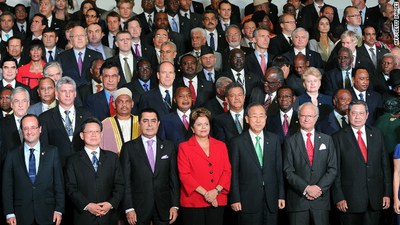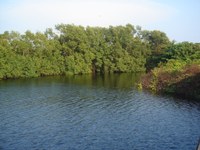The Future We Want From Rio+20: Analysis of Outcomes on Coastal and Marine Ecosystems in the Sustainable Coastal Tourism Context
Preamble
“……… We recognize that oceans are critical to sustaining Earth’s life support systems. Careless exploitation of the oceans and their resources puts at risk the ability of oceans to continue to provide food, other economic benefits and environmental services to humankind. We stress the importance of the conservation, sustainable management and equitable sharing of marine and ocean resources. We also recognize the significant economic, social and environmental contribution of coral reefs to island and coastal States, and support cooperation based on the Coral Triangle Initiative (CTI), and the International Coral Reef Initiative (ICRI)……..”
Excerpts from ’The Future We Want UNCSD Rio+20 Declaration’ by the World Leaders, Rio de Janeiro, 22nd June 2012.

Introduction: The Rio+20 Summit
The statement above amply summarizes the global leaders call for action in ensuring the sustainable utilization of coastal ecosystems including seas, oceans, and the marine bio diversity for socio economic development ventures that includes tourism. This statement is part of the declaration developed and adopted by the leaders and representatives of 191 UN Members states including 79 Heads of State and Government who attended the recently concluded UN Conference on Sustainable Development (UNCSD, or Rio+20).
The Summit was held in Rio de Janeiro, Brazil, from 13-24 June 2012 amid a backdrop of a weakened global economy, dampening the global expectations from this year’s conference. However, after heightened negotiations and sustained advocacy by civil society organizations, UN agencies, the curtains finally fell on the conference with some ‘glimmer of hope’ as, the global leaders issued what is hoped to be, yet another important declaration for the future of sustainable development. Many of the civil society stakeholders and environmental activists who attended the Summit however regret the failure by the international community to include ‘concrete or measurable results in key areas’ within this agreement.
Rio+20 Outcomes: In the Context of COAST Project Work in Africa
Many stakeholders are continuing to analyze the process, final products and way forward of Rio+20, and opinion remains divided on the final impact of the Rio+20 conferences. However, it is clear that for sustainable coastal tourism issues in the context of the COAST Project, this declaration is a step in the right direction. The Collaborative Actions for Sustainable Tourism (COAST) Project is working in 9 coastal states in Africa (Cameroon, Senegal, Kenya, Tanzania, Mozambique, the Gambia, Ghana, Nigeria and Seychelles) to enhance the adoption of Best Available Practices/Technologies for sustainable tourism practices in three main thematic areas; Eco-tourism Practices, Environmental Management Systems by hotels and Reef and Marine Recreation Management.
The COAST Project hopes to document working best practices on the afore-mentioned thematic areas and other areas such as waste management, energy efficiency, community participation in tourism and conservation of coral reefs through proactive engagement with the tourism sector. These are at the very core of some of the final Rio+20 outcomes. Indeed, the final outcomes in the Rio+20 Declaration highlighted issues around oceans and coastal marine biodiversity and the need to conserve them. In addition, and for the very first time, the issue of sustainable tourism was part and parcel of the deliberations at Rio+20 and was included in the outcome document from the conference.
On sustainable tourism, the global Leaders emphasized that well-designed and managed tourism could make a significant contribution to the three pillars of sustainable development (People, Planet and Profit) and could protect the environment (giving the environment and economic value) create decent jobs and generate trade opportunities. They further called for increased support to sustainable tourism activities and relevant capacity building that promote environmental awareness, conserve and protect the environment, respect wildlife, flora, biodiversity, ecosystems and cultural diversity, and improve the welfare and livelihoods of local communities. In addition, the Rio+20 Outcome document noted the importance of Eco-tourism as a sustainable touristic venture that needed more investment by the countries.
 For oceans, coastal and marine ecosystems and their associated biodiversity, the Rio+20 deliberations noted the importance of countries working to ...”advance implementation of the Global Programme of Action for the Protection of the Marine Environment from Land-based Activities, including further capacity-building and mobilization of resources for investment in treatment of human wastes and waste water and to develop a global action plan to combat marine litter and pollution”. Some of these issues were positively received by the Global Ocean Forum that brought together 375 participants from 46 countries during the Oceans Day celebrations held on the sidelines of Rio+20. In the Global Ocean Forum’s Declaration, the leaders expressed their appreciation for the high level of attention given to oceans, coasts, and SIDS in the Rio+20 Outcome document, and the recognition of their importance in achieving the three pillars of sustainable development.
For oceans, coastal and marine ecosystems and their associated biodiversity, the Rio+20 deliberations noted the importance of countries working to ...”advance implementation of the Global Programme of Action for the Protection of the Marine Environment from Land-based Activities, including further capacity-building and mobilization of resources for investment in treatment of human wastes and waste water and to develop a global action plan to combat marine litter and pollution”. Some of these issues were positively received by the Global Ocean Forum that brought together 375 participants from 46 countries during the Oceans Day celebrations held on the sidelines of Rio+20. In the Global Ocean Forum’s Declaration, the leaders expressed their appreciation for the high level of attention given to oceans, coasts, and SIDS in the Rio+20 Outcome document, and the recognition of their importance in achieving the three pillars of sustainable development.
These twin issues of coastal ecosystems and their marine biodiversity; and sustainable tourism highlighted in the Rio+20 Outcome Document represent an integral element of the work of UNEP, UNWTO and UNIDO GEF’s COAST Project.
|
OTHER AGREEMENTS REACHED AT THE RIO+20 CONFERENCE There were many other agreements on sustainable development that were reached during the Rio+20 Conference. In the final outcome document global leaders renewed their political commitment to sustainable development agreed to establish a set of sustainable development goals (SDGs) to take up from the MDGs in the post 2015 period and established a high-level political forum on sustainable development. They also called for a wide range of actions such as detailing how the green economy could be used as a tool to achieve sustainable development; measures for strengthening the UN Environment Programme (UNEP); promoting corporate sustainability reporting measures; taking steps to go beyond gross domestic product to assess the well-being of a country; developing a strategy for sustainable development financing; and adopting a framework for tackling sustainable consumption and production. The Rio+20 Outcome document also focuses on improving gender equity; recognizing the importance of voluntary commitments on sustainable development; and stressing the need to engage civil society and incorporate science into policy; among other points. With regard to financing sustainable development, the Rio+20 Secretariat together with the UN Global Compact and the Sustainable Energy for All initiative reported receiving over 700 Rio+20 voluntary commitments. These commitments were made by all stakeholders including governments UN system & IGOs the private sector civil society and NGOs. Collectively these tangible commitments mobilize more than $500 billion in actions towards sustainable development (UNCSD Figures). If these are sustained in the long term, the global efforts for sustainable development may bequeath a more prosperous future to the coming generations. |
CONCLUSION
 For Africa, sustainable Coastal tourism and conservation of coastal marine biodiversity are of critical importance now than ever before, and the global leader’s commitment in the Rio+20 Outcomes only serves to bolster the efforts of most players, like the COAST Project that are working towards this realization. As the global community sets out to confront the challenge of translating the Rio+20 outcomes into tangible achievable and measureable targets, our work in the nine Coastal Countries (Cameroon, Senegal, Kenya, Tanzania, Mozambique, Gambia, Ghana, Nigeria and Seychelles) will go a long way in informing the course of the activities in this thematic areas (Eco-Tourism, Environmental Management Systems and Reef and Marine Recreation and Management).
For Africa, sustainable Coastal tourism and conservation of coastal marine biodiversity are of critical importance now than ever before, and the global leader’s commitment in the Rio+20 Outcomes only serves to bolster the efforts of most players, like the COAST Project that are working towards this realization. As the global community sets out to confront the challenge of translating the Rio+20 outcomes into tangible achievable and measureable targets, our work in the nine Coastal Countries (Cameroon, Senegal, Kenya, Tanzania, Mozambique, Gambia, Ghana, Nigeria and Seychelles) will go a long way in informing the course of the activities in this thematic areas (Eco-Tourism, Environmental Management Systems and Reef and Marine Recreation and Management).
It is important to reiterate here that the COAST Project is in the process of developing, documenting and disseminating important lessons, best practices and technologies in the subject area of coastal tourism. As our experiences from the Demo Sites mature, we expect to be able to document some useful lessons on governance, management and policy - proposals that we will share with the global community. It is therefore important for the international community to lead the way in facilitating real sustainable development criteria for all sectors. In the days to come, the emerging Best Available Practices and Technologies, experiences and lessons leant from the COAST Project Demo Sites will be documented and disseminated broadly to help towards realization of the global vision as encapsulated in “The Future We Want” Declaration in areas pertaining to coastal ecosystems for Africa, and the rest of the world.
|
REFERENCES |
|
|
http://www.globaloceans.org/sites/udel.edu.globaloceans/files/RioOceanDeclaration.pdf; |
By Geoffrey Omedo,
Knowledge Management and Communications Officer,
COAST Project



















